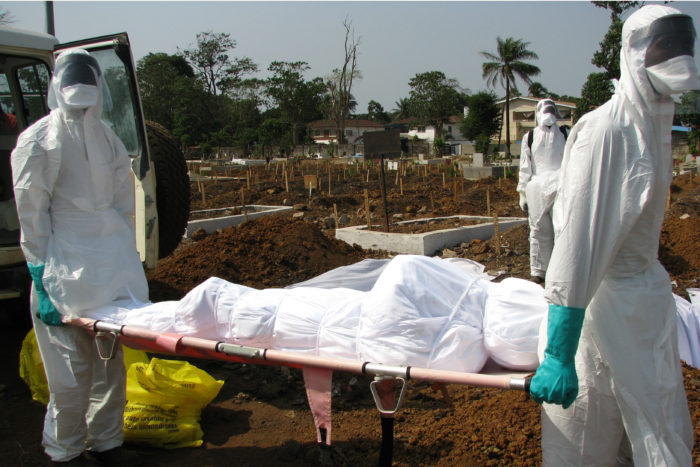Ebola focus of $13 million grant
Better understanding of how virus multiplies could lead to treatments
 Carrie Nielsen/CDC
Carrie Nielsen/CDCHow the Ebola virus replicates and interacts with the body is the focus of a $13 million grant awarded to a team led by researchers at Washington University School of Medicine in St. Louis. These studies may lead to the development of treatments for the deadly disease. Above, during the Ebola outbreak from 2014 to 2016, workers in protective gear carry the body of an Ebola victim in a cemetery in Sierra Leone.
A $13 million grant to study how the Ebola virus replicates has been awarded to a team led by Gaya Amarasinghe, PhD, an associate professor of pathology and immunology at Washington University School of Medicine in St. Louis.
The grant, from the National Institute for Allergy and Infectious Diseases of the National Institutes of Health (NIH), funds research into how the virus replicates and interacts with the body. These studies may lead to the development of drugs that treat Ebola by interfering with the viral replication process. Currently, there are no approved vaccines or specific drugs for the virus.
Ebola virus, which causes fever and profuse bleeding, is one of the deadliest viruses in the world, with death rates as high as 90 percent. Still, the virus has attracted relatively little research attention. A large epidemic that began in 2014 in the West African countries of Guinea, Liberia and Sierra Leone commanded worldwide attention, but before then, the virus was limited mostly to relatively small outbreaks in central Africa.
“My lab has been studying Ebola for some time, but the epidemic from 2014 to 2016 showed us that it has significant potential to impact global health,” said Amarasinghe, the grant’s principal investigator. “As we watched the epidemic unfold, I think we also realized that there’s a lot we don’t know about the basic biology of the virus, and that limits our ability to find ways to target it therapeutically.”
The primary goal of the grant is to understand the enzyme complex that the virus uses to replicate, including how it interacts with the body’s cells and with other factors such as the immune response.
“We think there are host factors that modulate the replication complex, but we don’t know what they are,” said Daisy Leung, PhD, an assistant professor of pathology and immunology who leads a section of the grant devoted to making the tools needed to study the virus and to investigating protein interactions. “We need to find out in order to identify targets for potential therapeutics.”
Although drug development per se is not the main focus of the grant, the scientists expect that knowledge gleaned from the research will lead to drug studies down the road.
“The replication complex is the only enzyme this virus has, and traditionally enzymes are good drug targets,” Amarasinghe said.
The grant represents a collaboration by 12 labs at seven institutions. Christopher Basler, PhD, at Georgia State University leads a project to identify how elements of the viral genome affect how much of the viral replication complex is synthesized, and how host factors impact the function of the complex. Douglas LaCount, PhD, at Purdue University and Robert Davey, PhD, at the Texas Biomedical Research Institute are leading a project to screen for host factors required for Ebola virus infection and replication.
Only the team at Texas Biomed will work with the live virus; the other labs will study proteins and nucleic acids from the virus. Since the disease has a high death rate and no vaccine or treatment, working with Ebola virus requires the highest level biosafety facility: level four. Texas Biomed has one of a handful of biosafety level four facilities in the United States.
“We have a long-standing collaboration with these other groups – we’ve published with them, we have other grants together – so doing this big project together is a natural progression of those collaborations,” Amarasinghe said. “It’s a unique opportunity in the sense that we have pulled together a really impressive set of expertise to address a very important question of our time.”
Other researchers involved in the grant include Maksym Artomov, PhD, an assistant professor of pathology and immunology, Michael Gross, PhD, a professor of chemistry, and Kathleen Sheehan, PhD, an assistant professor of pathology and immunology, all at Washington University School of Medicine; Wah Chiu, PhD, of Baylor University; Jeffrey S. Kieft, PhD, of the University of Colorado; Zbyszek Otwinowski, PhD, and Dominika Borek, PhD, of the University of Texas Southwestern Medical Center; and Sachdev Sidhu, PhD, of the University of Toronto.






